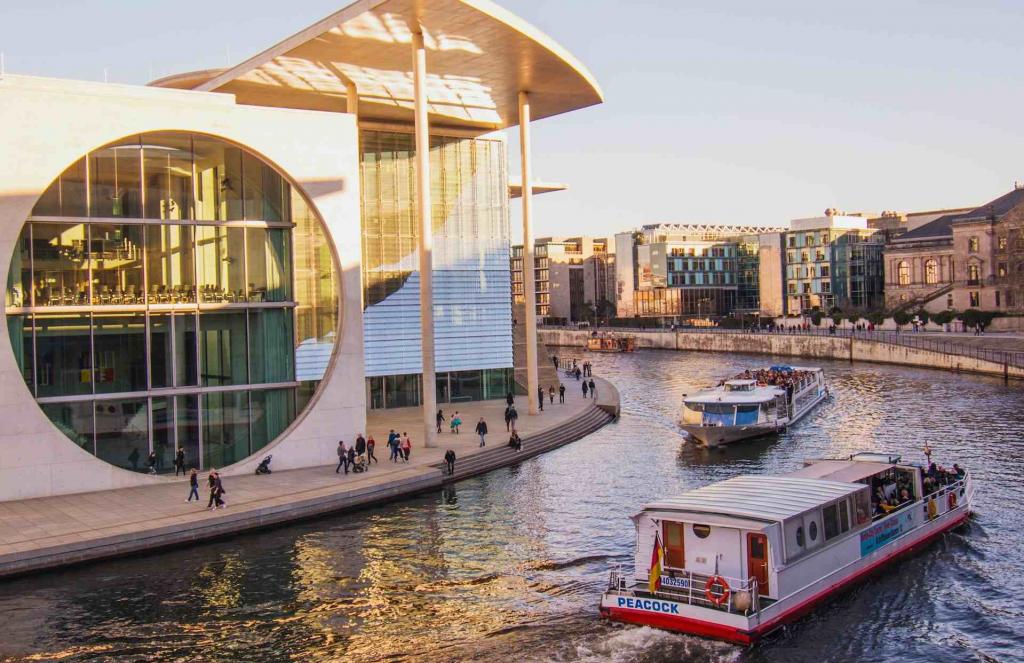Thessaloniki gets ready for its metro launch in November
The underground rapid transit lines have been under construction for almost two decades due to various project delays
 TheMayor.EU logo
TheMayor.EU logo 
Berlin wants to revitalise water traffic at the city's inland ports , Source: Julia Solonina / Unsplash
The city also plans to boost parking zones for loading and deliveries, as well as for people with disabilities, at the expense of those for regular cars
Yesterday, authorities in Berlin adopted the newest amendment of the Mobility Act (Mobilitätsgesetz), which focuses primarily on commercial traffic and building a future concept for the German capital. One of the key points of the strategy is the reinvigoration of the inland ports and the reopening of the ones that have closed down over the years.
Additionally, the city wants to take some parking spots away from private vehicles and open them up to commercial traffic, such as deliveries and loading zones. This would come with additional regulations pushing that type of traffic to the calmer hours of the night.
The concept comes with a platform for digital traffic data aimed at service providers to help gauge flows. This would mean that local authorities would offer a digital layer to mobility going forward, making knowledge-based policy and decisions more viable.
Transporting goods through waterways is definitely not a new idea. In fact, it is also the cheapest form of commercial traffic available. In this sense, despite the fact that Berlin is hundreds of kilometres away from the coast, it can make use of the canals, lakes and rivers passing in and around the city.
Berlin has several public ports: Westhafen, Südhafen Spandau, Hafen Neukölln. According to a statement by local authorities, they should continue to enjoy maintenance services, while some that have been closed, should reopen.
Additionally, when it comes to creating new parking spaces, the city will focus on those boosting designated delivery and loading zones, as well as spaces for people with disabilities.
The development of Berlin’s mobility strategy started in 2018 initially, with a focus on public transport and bike traffic. Then, in 2021, it was expanded to feature pedestrians. Now Mobility Senator Bettina Jarasch proclaimed that the strategy is complete with the final concepts tackling rail, water and freight traffic.
She was quoted in a press statement saying: “Commercial traffic affects us all. Our goal is to organize it in Berlin in a way that is compatible with the city, so that the flow of goods, delivery and disposal traffic works smoothly everywhere. We secure important infrastructure for transport by rail and water and for the handling of goods and create incentives for the use of low-emission commercial vehicles.”

The underground rapid transit lines have been under construction for almost two decades due to various project delays

Now you can get your wine in Talence by paying directly in Bitcoin

That’s because the state has to spend money on updating the railway infrastructure rather than subsidizing the cost of the popular pass

Rethinking renewable energy sources for the urban landscape

The examples, compiled by Beyond Fossil Fuels, can inform and inspire communities and entrepreneurs that still feel trepidation at the prospect of energy transition

Now you can get your wine in Talence by paying directly in Bitcoin

The 10th European Conference on Sustainable Cities and Towns (ESCT) sets the stage for stronger cooperation between the EU, national and local level to fast track Europe's transition to climate neutrality.

At least, that’s the promise made by the mayor of Paris, Anne Hidalgo

The underground rapid transit lines have been under construction for almost two decades due to various project delays

At least, that’s the promise made by the mayor of Paris, Anne Hidalgo

Hostal de Pinós is located in the geographical centre of the autonomous region

Despite its church-y name, the district has long been known as the hangout spot for the artsy crowds

Urban dwellers across the EU are having a say in making their surroundings friendlier to people and the environment.

Forests in the EU can help green the European construction industry and bolster a continent-wide push for architectural improvements.

Apply by 10 November and do your part for the transformation of European public spaces

An interview with the Mayor of a Polish city that seeks to reinvent itself

An interview with the newly elected ICLEI President and Mayor of Malmö

A conversation with the Mayor of Lisbon about the spirit and dimensions of innovation present in the Portuguese capital














